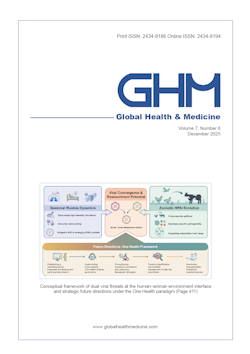Global Health & Medicine 2019;1(1):11-15.
The role of the G20 economies in global health.
Akashi H, Ishizuka A, Lee S, Irie M, Oketani H, Akashi R
The Meetings of Health Ministers of the Group of Twenty (G20) that started at the G20 Summit in Berlin, Germany in 2017 have provided a platform for the discussion of global health matters such as antimicrobial resistance (AMR), public health emergencies, and universal health coverage. Similar issues are also discussed at meetings of the G7 and the World Health Assembly (WHA). This article will examine recent data to explore the characteristics of the G20 and its potential for improving health outcomes. G20 countries have a leading role to play in helping other countries improve global health outcomes because member countries have already faced many issues associated with aging society and increased prevalence of non-communicable diseases (NCDs). Indeed, 71% of the world's elderly population lives in the G20 countries and most of these countries have a high proportional mortality from NCDs of more than 70%. G20 countries are also responsible for a disproportionate share of global impacts. For instance, 72% of CO2 emissions are produced by G20 countries. Migration dynamics and its consequences also need to be considered from the perspective of optimizing health outcomes. Moreover, 78% of the world's top 50 pharmaceutical companies are located in the G20 countries. There is ample room for G20 countries to pursue collaborative and cooperative approaches that can complement the roles of the G7 and WHA in similar health issues. The G20 could, for example, share experiences on dealing with aging and NCDs, reduce their CO2 emissions, prohibit the production of low-quality medicines, and use standardized health check-up formats for migrants and refugees to transfer their own health information. As a group, the G20 countries have the potential to solve global health problems and other issues. The convening of high-level health meetings at G20 summits has the potential to facilitate such endeavors.
DOI: 10.35772/ghm.2019.01008







